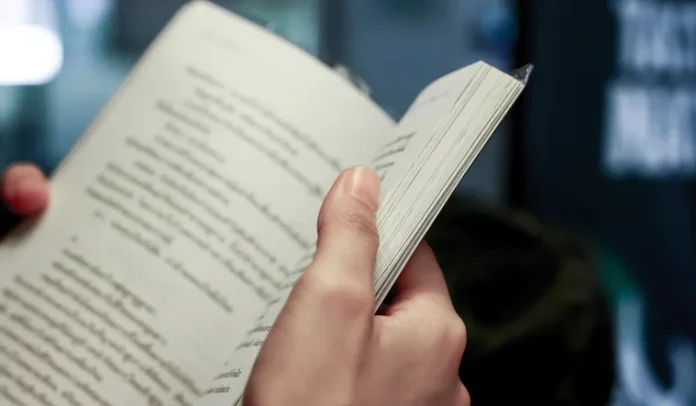Liba Hopeson
We live in a society where butchers can sell hundreds of kilograms of meat every day, yet a single bookstore struggles to survive because so few people choose to buy books. Once I quipped a fun fact on my WhatsApp status that if you open a book store in Senapati town, you would fail successfully. While I’m not here to advocate for the end of meat consumption, the widespread disinterest in buying and reading books within a society is undeniably a troubling omen. As much as we get anxious when our society is obsessed with drugs and alcohol, we ought to be concerned and worried when there is a dying culture of reading.
Our foreparents lived in a time without written records. They preserved their knowledge, traditions, stories, and stories, and songs through oral culture, passing them down from generation to generation. When we began to learn and develop the importance of reading, writing and documenting, fortunately or unfortunately, the computer and digital age dawned. Today, we are flooded with information. We live in a society where people give more importance to visual and audio than reading and writing. Today, we learn that many bookstores have been closed down in various parts of the world due to technological gadgets. But nothing beats reading from hard copy. Studies have consistently shown that reading from hard copies enhances comprehension and retention far better than reading from screens. In these challenging times, it is imperative that we actively cultivate and promote a strong culture of reading.
Throughout history, the advancement of civilizations has been intrinsically tied to the development and practice of reading. From ancient Mesopotamia, where cuneiform tablets recorded trade, laws, and stories, to the scholarly traditions of ancient China, Greece and Egypt, the ability to read and write allowed societies to store knowledge, pass down cultural values, and advance scientific and technological innovations. Reading enabled the codification of laws, the transmission of religious texts, and the preservation of history, which fostered governance, ethical systems, and educational frameworks essential for the progress of society. Even oral cultures eventually developed reading and writing systems to enhance communication, trade, and diplomacy across expanding territories. No known civilization has achieved significant advancement without incorporating reading in some form, demonstrating its fundamental role in human development and the collective pursuit of knowledge.
For a society to grow, we need to think, and in order to think, we should read because reading is the gateway to knowledge, creativity, and critical analysis. When we read, we encounter new ideas, challenge existing beliefs, and develop the ability to think independently, all of which are essential for societal progress. Studies have consistently shown that reading enhances cognitive skills, improves empathy, and strengthens problem-solving abilities. Historically, societies with higher literacy rates tend to experience faster economic growth, better governance, and improved social mobility, as informed citizens contribute more effectively to public discourse and decision making.
Humans are naturally drawn to what is pleasurable – we seek comfort, taste, and enjoyment, often without question. Eating a rich, delicious pork curry is undoubtedly gratifying, filling both stomach and soul with warmth and flavor. However, what is enjoyable in the moment does not always lead to lasting happiness or growth. Choosing to sacrifice one kg of pork for a book may seem like denying oneself pleasure, but in reality, it is an investment in something deeper. While the curry satisfies for a meal, a book can nourish the mind for a lifetime, offering knowledge, inspiration, and new perspectives. True fulfillment often comes not from immediate gratification, but from choices that enrich our lives in the long run.
I’m not, in any way, suggesting that we should totally abstain from purchasing pork or consuming meat, but we should never grudge on spending money on books. Buying books is not a waste of money but an investment. Imagine your house is completely destroyed by a fire, swept by a landslide, or washed away by a flood – what would you do in such a situation? In moments like these, what can you truly take with you? The only possession that remains truly portable and indestructible is knowledge. Valuing knowledge as something that can never be taken away is a core part of Jewish philosophy and culture mindset. In Jewish thought, learning – especially the study of Torah and other texts – is seen as a lifelong duty and a form of spiritual wealth. This philosophy has roots in ancient teachings, including in the Talmud, which often stresses that wisdom and learning are treasures that remain with a person no matter where they go, even if material possessions are lost. This focus on portable knowledge became especially important given Jewish history of exile, migration, and persecution.
Knowledge is a priceless treasure, and owning a good book is a true investment in yourself. Never let life pass you by without reading and learning. Sometimes, it’s worth giving up something you want for something your mind truly needs. Whether it’s a kilogram of pork, a plate of chow and momo, pizza, biryani, KFC, a new dress, or a pair of shoes – once in a while, skip a small indulgence and invest in a book for your well-being. The value it brings will always last longer. Reading does not just provide information – it cultivates curiosity, broadens perspectives, and equips individuals to think critically, which is the foundation of any thriving society. Invest in books – every book you buy is a seed for your mind’s garden.

